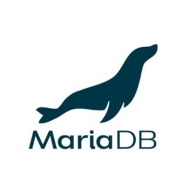

SQLite and MariaDB are competing database management systems. While SQLite shines in simplicity and integration for lightweight applications, MariaDB takes the lead in scalability and complex feature sets, making it a preferred option for enterprise-level applications.
Features: SQLite is known for its lightweight nature, ease of deployment, and serverless architecture making it ideal for single-user or on-device applications. MariaDB provides replication, clustering, and stored procedures, supporting high-volume transactions and complex data queries.
Room for Improvement: SQLite could enhance scalability and multi-user capabilities, improve support for concurrent operations, and offer more robust data security features. MariaDB might benefit from streamlining initial setup complexity, improving documentation for troubleshooting, and optimizing performance for smaller datasets.
Ease of Deployment and Customer Service: SQLite offers easy setup with minimal overhead due to its serverless architecture, integrating directly within applications. MariaDB, while requiring more initial setup, provides extensive customer support and comprehensive options for backup and recovery in scalable environments.
Pricing and ROI: SQLite is cost-effective with low implementation costs, yielding good ROI for simple use-cases. MariaDB, with higher initial costs, offers significant returns through its advanced features suitable for high-performance and scalable applications.
| Product | Mindshare (%) |
|---|---|
| MariaDB | 5.9% |
| SQLite | 5.4% |
| Other | 88.7% |

| Company Size | Count |
|---|---|
| Small Business | 27 |
| Midsize Enterprise | 12 |
| Large Enterprise | 26 |
| Company Size | Count |
|---|---|
| Small Business | 5 |
| Midsize Enterprise | 1 |
| Large Enterprise | 3 |
MariaDB is an open source relational database created by the original founders of MySQL. It is considered one of the most popular and trusted database servers throughout the world. MariaDB is a valued component found in most cloud offerings and is the default in many Linux tools. It is also widely used by Wikipedia, WordPress, and Google, among other well-known sites. Maria DB easily melds data into concise information from a vast array of applications, such as banking, online shopping, websites, and more.
MariaDB was originally created to improve MySQL performance. It is the most widely chosen database server due to the solution being super fast, robust, user-friendly, and easily scalable. MariaDB also offers a substantial ecosystem of plugins, storage engines, and numerous other valuable tools that make it very attractive for a significant offering of use cases.
The solution’s newest functionalities include compatibility with Oracle Database and Temporal Data Tables, and advanced clustering with Galera Cluster 4, which make it easier for users to research data history from any point in the past. Additionally, the most recent versions include JSON and GIS features. MariaDB is committed to staying an open source solution.
MariaDB Features
Reviews from Real Users
Faustine C., Engineering Supervisor- Corporate Data Solutions and Services at TZ Telecoms Corporation, shares, “The software provides a lot of information on what is happening inside the database. For most performance parameters it is easy to know if something is not right in the configuration or optimization which helps engineers take remedial fine-tuning measures. For example, if the database is underperforming it is easy to know which performance parameter can be adjusted to handle the workload. It is difficult to troubleshoot database issues if many performance parameters can not be monitored or debugged which is the case with some database management systems. It provides great monitoring of data storage, processing, and performance stability which is really important for real-time data storage and processing. It's a user-friendly product.”
A PeerSpot user who is a Senior Engineer at a tech services company relates, “ The solution's high availability is its most valuable aspect. We have found the product to be stable and the initial setup is pretty simple. I'd rate the solution at a ten out of ten. I'm very happy with it overall. I would recommend the solution to others. It's easy to find details about the product online and to learn about it.”
SQLite is an open-source, serverless, reliable, and flexible, SQL database engine. It is particularly favored in the realm of embedded database solutions and small to medium-sized projects. Unlike traditional database systems that operate on a client-server model, SQLite is a serverless database engine, meaning it runs directly within the application it powers. This unique architecture makes SQLite an ideal choice for applications where simplicity, efficiency, and minimal configuration are paramount.
SQLite is an embedded database engine, which means it operates directly within the application that uses it, without requiring a separate server process. It is designed to be cross-platform, supporting multiple operating systems, and is is compatible with a wide range of programming languages, such as C, C++, Python, Java, and more. This makes it highly portable and suitable for a wide range of applications, from mobile devices to desktop software and web applications.
The key advantages of SQLite is its reliability, the lightweight nature and efficient performance. It has a small footprint, typically requiring only a few megabytes of disk space, and can operate entirely in memory if needed. It is designed to be reliable and robust, with built-in features such as atomic commit and rollback, which ensure data integrity even in the event of system crashes or power failures. Finally, the SQLite solution requires no configuration or setup, making it easy to use and deploy. It can be embedded directly into applications without the need for complex installation or configuration procedures.
SQLite Functionality
SQLite is an open-source project distributed under a public domain license, which means it can be used, modified, and distributed freely, without any licensing costs or restrictions.
To summarize, SQLite is widely used in various applications, including web browsers (e.g., Mozilla Firefox, Google Chrome), mobile applications (e.g., Android, iOS), embedded systems, and desktop software. Its simplicity, portability, and efficiency make it a popular choice for developers who require a lightweight and reliable database solution, especially in resource-constrained environments or applications with modest data storage needs.
We monitor all Open Source Databases reviews to prevent fraudulent reviews and keep review quality high. We do not post reviews by company employees or direct competitors. We validate each review for authenticity via cross-reference with LinkedIn, and personal follow-up with the reviewer when necessary.